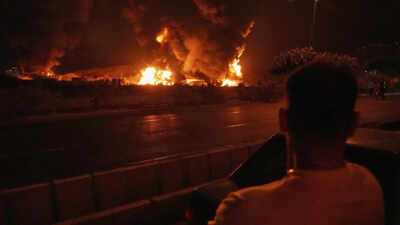
Six days into a fragile ceasefire brokered by the United States, Iran on Sunday said it does not trust Israel to uphold its end of the truce, as both nations continue to reel from the most violent confrontation in their history.
The 12-day war, triggered by an Israeli bombing campaign that targeted Iran’s top nuclear scientists and commanders, has left hundreds dead, diplomatic efforts in disarray, and fresh geopolitical scars on an already tense region.“We have serious doubts over the enemy's compliance with its commitments including the ceasefire,” said Abdolrahim Mousavi, chief of staff of Iran’s armed forces, in a statement aired by state television.
“We are ready to respond with force if attacked again.”The conflict began on June 13, when Israel launched what it called a pre-emptive bombing campaign targeting Iran’s nuclear infrastructure. It claimed the strikes were aimed at preventing Iran from acquiring a nuclear weapon—a charge Tehran has consistently denied.Iran accuses US and Israel of aggressionIn a strongly-worded letter to UN Secretary-General Antonio Guterres, Iran’s Foreign Minister Abbas Araghchi urged the United Nations Security Council to officially hold Israel and the United States responsible for initiating what Tehran described as an act of aggression.
“We officially request that the Security Council recognise the Israeli regime and the United States as the initiators of the act of aggression and acknowledge their subsequent responsibility, including the payment of compensation and reparations,” Araghchi wrote.The US military had joined Israeli forces in the campaign, carrying out airstrikes on three of Iran’s key nuclear facilities during the conflict. American President Donald Trump, who announced the ceasefire last week, had also threatened further strikes if Iran resumed uranium enrichment at weapons-grade levels.Nuclear talks derailed, casualties mountThe war has derailed nuclear negotiations between Iran and the United States, talks that were already hanging by a thread after the US withdrawal from the 2015 nuclear deal in 2018. According to the International Atomic Energy Agency, Iran had enriched uranium up to 60% purity in 2021, well beyond the 3.67% limit set by the original agreement but still short of the 90% threshold needed for weaponization.Meanwhile, the human toll of the war continues to emerge.
Iran’s health ministry said on Sunday that at least 627 civilians were killed and 4,900 injured in Israeli airstrikes. In retaliation, Iranian missiles killed 28 people in Israel, according to official figures from Tel Aviv.Iran also arrested dozens of alleged Israeli spies, claiming to have seized weapons, drones, and surveillance equipment during security operations conducted alongside its retaliatory military actions.‘Unacceptable’: Strike on Evin prison draws global criticismAmong the most controversial strikes of the conflict was an Israeli missile attack on Tehran’s Evin prison, which Iran’s judiciary confirmed on Sunday killed at least 71 people. The victims reportedly included prison guards, administrative staff, inmates, visiting relatives, and civilians in nearby buildings.Iranian officials said the strike destroyed part of the prison's administrative block, sparking an international outcry.
French Foreign Minister Jean-Noel Barrot condemned the bombing as “unacceptable,” though confirmed that detained French nationals Cecile Kohler and Jacques Paris were unharmed.Evin prison, long known for holding political prisoners and dual nationals, also houses Nobel Peace Prize laureate Narges Mohammadi and several European citizens. Authorities later said inmates had been transferred, but did not disclose how many or to where.Crackdown on foreign tech and internal dissentIn a further sign of tightening internal controls, Iran’s parliament on Sunday passed a law banning unauthorized use of communication tools, including Elon Musk’s Starlink satellite internet service. The move follows reports of protesters and independent journalists using Starlink to evade state censorship during the conflict.

 6 hours ago
50
6 hours ago
50




























 English (US)
English (US)